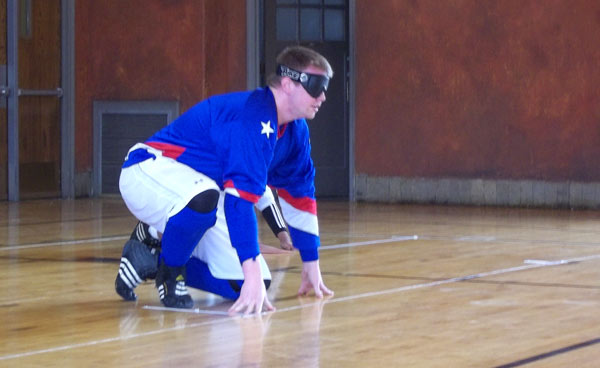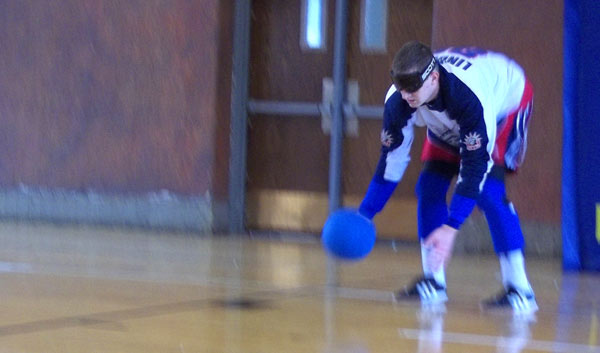Goalball levels the playing field for sighted, visually impaired
March 18th, 2011 Posted in Arts and LifeStory & Photos by Cathy Morgan
LOGAN—People with disabilities may be told they’ll never be able to accomplish anything, but those involved in the blind and visually impaired sport of goalball at USU will tell you differently.
 A pair of Europeans—Austrian Hanz Lorenzen and German Sepp Reindle—invented goalball in 1946 to help rehabilitate blinded WWII veterans. It was introduced into the Paralympic Games in 1976. Along with judo and beep baseball, goalball is becoming one of the most popular sports among the blind.
A pair of Europeans—Austrian Hanz Lorenzen and German Sepp Reindle—invented goalball in 1946 to help rehabilitate blinded WWII veterans. It was introduced into the Paralympic Games in 1976. Along with judo and beep baseball, goalball is becoming one of the most popular sports among the blind.
When those with visual impairments want to get involved in most sports, they generally need some sort of adaptation. With baseball, for example, a bigger ball is used. Goalball is a sport that puts everyone on equal ground, and everyone has the same opportunities to achieve a goal.
The game is played on a gym floor the size of a basketball court. Raised taped lines are placed on both ends of the court to show players where they are and to help them maintain their positions while playing. There are three players on each end of the court and six players on a team. The ball itself is about the same size as a basketball with bells in it for players to hear.
The object of the game is to throw yourself down to keep the ball from being thrown into your goal. Think of it like bowling and dodge ball when picturing the throwing motion, but you’re getting in front of the ball.
What makes this game so interesting is that everyone plays blindfolded to make it fair for everyone. There are many different degrees of blindness; the blindfold keeps the playing field level.
There are seven or eight regular players in the Logan area, many of them USU students. With every sport, of course, you need a place to practice. To be able to reserve a USU gym, the group put together their own USU goalball club.
Anyone is welcome to come and help or watch at the practices. Because the Utah coaches live in Salt Lake City, the players coach themselves and help each other, and travel to Salt Lake for practice a few Saturdays a month.
Now the question is, why do the visually impaired find themselves drawn to the sport? Also, what are the benefits of getting involved?
“A lot of visually impaired people don’t do much of anything and they aren’t active,” said Lewis Burdette, 21, a USU student on the Utah team. “Their day-to-day lives aren’t as easy and they are not as strong or balanced as most people.”
That’s why Burdette thinks those with disabilities need to get involved more with sports.
Andy Jenks, 20, the youngest player for the USA men’s Paralympic goalball team, has competed at every level available and earned two national championships with his club team in Philadelphia. He’s also competed on the youth world’s team as well as at youth nationals.
“I can compete in a competitive sport and not be at a disadvantage because of my vision,” he said. “Compare it to football where you’re  allowed to hit someone as hard as you can to win.”
allowed to hit someone as hard as you can to win.”
Jenks often visits Utah for tournaments and comes to USU to help train local goalballers.
USU student Herschel Kelly, 21, moved to Logan partially because he wanted regular practices with his goalball teammates. Kelly has been playing for just three years, but he says it has helped him straighten out his life.
“Goalball gives people a niche into a social network, they don’t always have the support they need,” Kelly said.
“Without goalball I would’ve never known so many other blind people around the world, it really helps with networking,” said Ashleigh Hiett, 17, a youth player from Florida trying out for the USA national women’s team. “It really gives athletes the same opportunity to be like everyone else.”
Hiette recently visited Utah to participate in a youth tournament.
This is prime goalball season, and USU’s goalball team recently traveled to compete in a tournament Kalamazoo, Mich. The men’s team placed 8th out of the 16 teams competing, including two from Canada.
Now team members say they obviously need to work harder on communication while on the court. Other upcoming tournaments take place in New Jersey, Utah, Washington state, as well as nationals in New York in June.
Those involved at the Paralympic level will travel to Turkey to qualify for the Paralympics in England in 2012.
For those interested watching goalball or helping with a practice at USU, club practices are Wednesdays from 3:30-5:20 p.m. at the Hyper building, in one of the big upstairs gyms.
For information about the Western Regional Tournament in Utah April 29-30, see the Utah Federation for the Blind and Visually Impaired website. Volunteers are always welcome, or just come watch and learn how the game is played.
Morgan is a member of the USU goalball club, whose team recently traveled to Michigan to compete in a regional tournament.
TP

Sorry, comments for this entry are closed at this time.